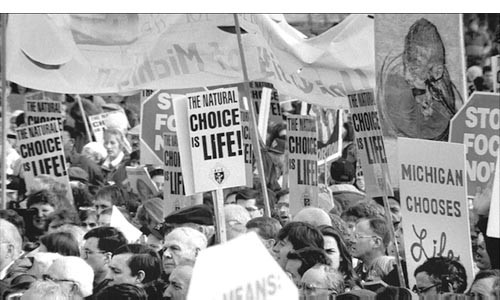Tony Kaye's provocative film essay about abortion in contemporary America draws its title from an oft-cited landmark of hell, where sinners will spend an agonizing eternity in an inescapable inferno. "Like being in molten lava forever," offers one of the film's interview subjects, helpfully.
Or maybe not. Add our posthumous fates to the list of unknowns that categorize the roiling cultural, political and ethical clash that is the ever-expanding debate over legal abortion: When does human life begin; what makes a death a murder, and who is to judge; how to reconcile conflicting individual rights; science vs. God; and so on.
If Lake of Fire is not a labor of love, then surely it is one of dedication and single-mindedness. Who else would even touch the topic? Kaye, a British vet of commercial and video work whose one other feature was the controversial 1998 neo-Nazi drama American History X, spent 17 years making Lake of Fire; he wrote, directed, produced, shot and financed the film himself.
Kaye's film is not a primer: If you're just coming out of a three-decade coma, Lake of Fire will not offer a newsy evolution of abortion politics since the 1973 Supreme Court decision to legalize abortion.
Instead, Kaye explores the divisive issue, presenting all opinions as they stand; you supply much of the context. Well-known pro and con organizations such as Planned Parenthood and Operation Rescue check in, as do others caught up in the mix, including clinic workers, preachers, protesters, law enforcement and politicians. Shooting primarily during the 1990s, Kaye is on hand for the worst of the street screaming matches, and the several murders and bombings that targeted doctors and their facilities.
For the most part, Kaye tackles this hot-button topic with restraint. His aesthetic choice to shoot in black and white helps keep the film's temperature cool -- this is a look we still associate with sober news.
But Kaye doesn't shy from presenting the discomforting on both sides. There is material in this film to annoy everybody at some point: a near-naked punk act that simulates an abortion with a bent hanger; Pat Buchanan; drag queens; and a creepy, child-tending preacher who claims that California schools administer a "Lift Up Your Dress Week" in sixth grade to determine who is a homosexual. Irksome theatrics aside, Kaye purposefully employs graphic footage -- including two abortions he shot, as well as excerpts from an anti-abortion film that depicts clearly identifiable fetal body parts.
Throughout Lake, Kaye repeatedly shifts -- first this impassioned argument, then its corollary from the other side, then an abstracted opinion from the middle. Assorted bio-ethicists, academics and known commodities such as Noam Chomsky, Nat Hentoff and Alan Dershowitz weigh in on what makes the abortion issue so problematic.
In a nutshell, the talking heads mostly posit, what we value -- even deeply -- tends to be held conditionally, continually weighed against circumstances and experiences that can't be standardized. Thus, something as fundamental as the preservation of life runs a spectrum from acceptable to unthinkable. Consider the ethical mess that is the Paul Hill case, a hodgepodge of "right" and "wrong" killings. In 1994, Hill went from yelling "baby killer" at women entering a Florida clinic to shooting and killing the facility's doctor and two colleagues. He was convicted and, in 2003, executed by lethal injection by the state -- but not before claiming that it was a "wonderful privilege to die for innocent people."
At 152 minutes, Lake of Fire is a long time to spend on what can feel like familiar turf. And yet, those deeply invested in the issue will surely complain about what has been left out. For instance, while statistics are cited regarding everything from teen pregnancy rates to numbers of abortions performed to the decline in doctors and facilities offering the procedure -- these are proffered by interviewees and have no authenticated source. Also, there's virtually no discussion of legislation and court decisions in the wake of Roe v. Wade (e.g., laws governing the space outside clinics, and such restrictions as parental notification and waiting periods, added by some states).
Perhaps acknowledging that talking heads are just that -- abstracted pontificators (and many are men) -- Kaye saves his most wrenching material for the final reel. There, we follow 28-year-old Stacey through her abortion -- from her solitary vigil waiting for a ride through the counseling and procedure to her reflections in the recovery room. As if to sum up the film's stipulation that everybody is both right and wrong, Stacey's history and choices include arguments both for and against. Nonetheless, her day at the clinic is agonizing from any perspective.
Perhaps more than anything, Lake of Fire casts into sharp relief what an irresolvable debate abortion has become -- this state of neverending crisis, the push-me-pull-you of propaganda, political posturing and hand-wringing on both sides. Entire lifetimes -- four decades down, four to go -- will most likely be colored by this impenetrable and pervasive divisiveness.
Yet ultimately, Lake of Fire only scratches the surface of what has caused this debate to morph into such an all-encompassing war. Since the Roe v. Wade flashpoint, the issue of abortion has spread into an unchecked wildfire fueled by unlimited tinder well beyond discussions of the physical procedure: fundamentalist religion, gender roles, government health care, culture wars, presidential campaigns, taxes, education, assorted freedoms of choice, etc. etc.
There have always been abortions, and other Western nations have legalized abortion without all the attendant drama. What is it about this place and this time that has caused such a conflagration? Clearly, if the answer is to be found in hindsight, the time for that discovery has not yet come. We'll be waiting it out here in our own lake of fire. 
Starts Fri., Dec. 30. Melwood















